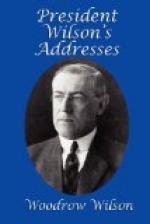Introduction
First Inaugural Address
First Address to Congress
Address on the Banking System
Address at Gettysburg
Address on Mexican Affairs
Understanding America
Address before the Southern Commercial Congress
The State of the Union
Trusts and Monopolies
Panama Canal Tolls
The Tampico Incident
In the Firmament of Memory
Memorial Day Address at Arlington
Closing a Chapter
Annapolis Commencement Address
The Meaning of Liberty
American Neutrality
Appeal for Additional Revenue
The Opinion of the World
The Power of Christian Young Men
Annual Address to Congress
A Message
Address before the United States Chamber of Commerce
To Naturalized Citizens
Address at Milwaukee
The Submarine Question
American Principles
The Demands of Railway Employees
Speech of Acceptance
Lincoln’s Beginnings
The Triumph of Women’s Suffrage
The Terms of Peace
Meeting Germany’s Challenge
Request for Authority
Second Inaugural Address
The Call to War
To the Country
The German Plot
Reply to the Pope
Labor must be Free
The Call for War with Austria-Hungary
Government Administration of Railways
The Conditions of Peace
Force to the Utmost
INTRODUCTION
These addresses of President Woodrow Wilson represent only the most recent phase of his intellectual activity. They are almost entirely concerned with political affairs, and more specifically with defining Americanism. It will not be forgotten, however, that the life of Mr. Wilson as President of the United States is but a short period compared with the whole of his public career as professor of jurisprudence, history, and politics, as President of Princeton University, as Governor of New Jersey, as an orator, and as a writer of many books.
Surprise has been expressed that a man, after reaching the age of fifty, should be able to step from the “quiet” life of a teacher and author into the resounding regions of politics; but Mr. Wilson’s life as a scholar, professor, and author was not at all quiet in the sense of being easy or untouched with exciting chances and changes, and, in the second place, he carried into politics the steadying ideals and the methodical habits of his former occupation.
As these addresses themselves prove, he has retained something of the teacher’s interest in showing the relation between specific instances and the general forms of thought or action of which they are a part. Not fact alone, but principle, is what he seeks to discover to his audiences. In the addresses made in 1913 it is apparent that his main effort was to fasten attention upon the principles of international justice and good will and to restrain the impulses of those Americans who were inclined to hasty action with reference to Mexico. From the beginning




